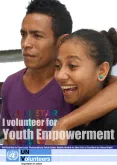I volunteer for youth empowerment is the theme the UNV Field Unit in Timor-Leste is promoting throughout 2013. The UNV Field Unit in Timor-Leste began its campaign in May by holding a one-day briefing for students at Universidade Nacional Timor Lorosae (UNTL) to enhance their ability to engage rural communities, especially youth, during their field work in the districts.
I volunteer for youth empowerment is the theme the UNV Field Unit in Timor-Leste is promoting throughout 2013. The UNV Field Unit in Timor-Leste began its campaign by holding a one-day briefing for students at Universidade Nacional Timor Lorosae (UNTL) to enhance their ability to engage rural communities, especially youth, during their field work in the districts.
The session aimed to empower the university students to solve challenges they might encounter, and thus help Timor-Leste face its challenges and take one step closer to achieving Millennium Development Goals (MDGs).
More than 30 students from the Faculties of Education, Agriculture and Medicine participated in the session. Experts from UNICEF, the World Health Organization (WHO) and Na Terra NGO provided training in three Millennium Development Goal (MDG)-related fields; nutrition (MDG 1), water, sanitation and hygiene (MDG 7), and sustainable agriculture (MDG 7).
According to water and sanitation trainer, Muhammad Kurniawan Afrianto, a UN Volunteer with UNICEF, the students needed to go to their districts equipped with mutual respect.
Dont ever think that people from the community dont know anything, he instructed. Therefore you are there to learn together about their situation and problems.
Poor sanitation is everybodys concern, Muhammad continued, so when you go to the community, you should facilitate assessing their sanitation issues and help them to prepare for action to resolve them.
Students learned how to prepare and give presentations to brief residents in districts where they will do their field work. For example, agriculture students typically go to the districts where they work with local farmers. They evaluate the soil and help prepare the planting beds to grow suitable crops.
In giving the training in sustainable agriculture, Fernando Madeira, with the NaTerra NGO, impressed upon participants that they had to speak in simple terms and present simple solutions without too many details if they wanted to get their points across to local farmers.
The UNTL participants were given sports equipment, including footballs, volleyballs and nets and badminton equipment, to help engage local youth, inspire their interest in volunteerism and inform them about the importance of young peoples engagement in development and peace in Timor-Leste.
Students said they gained a better understanding about volunteering and MDGs. Hendra Manafe, a UNTL student in the Faculty of Medicine, anticipated the training would be really helpful to him in his field work in the district. One of the main problems is that most communities in the districts do not have access to clean water, Hendra said. He agreed that sport is a powerful method to engage youth and said It not only brings them together for a good cause, but it improves their health.

